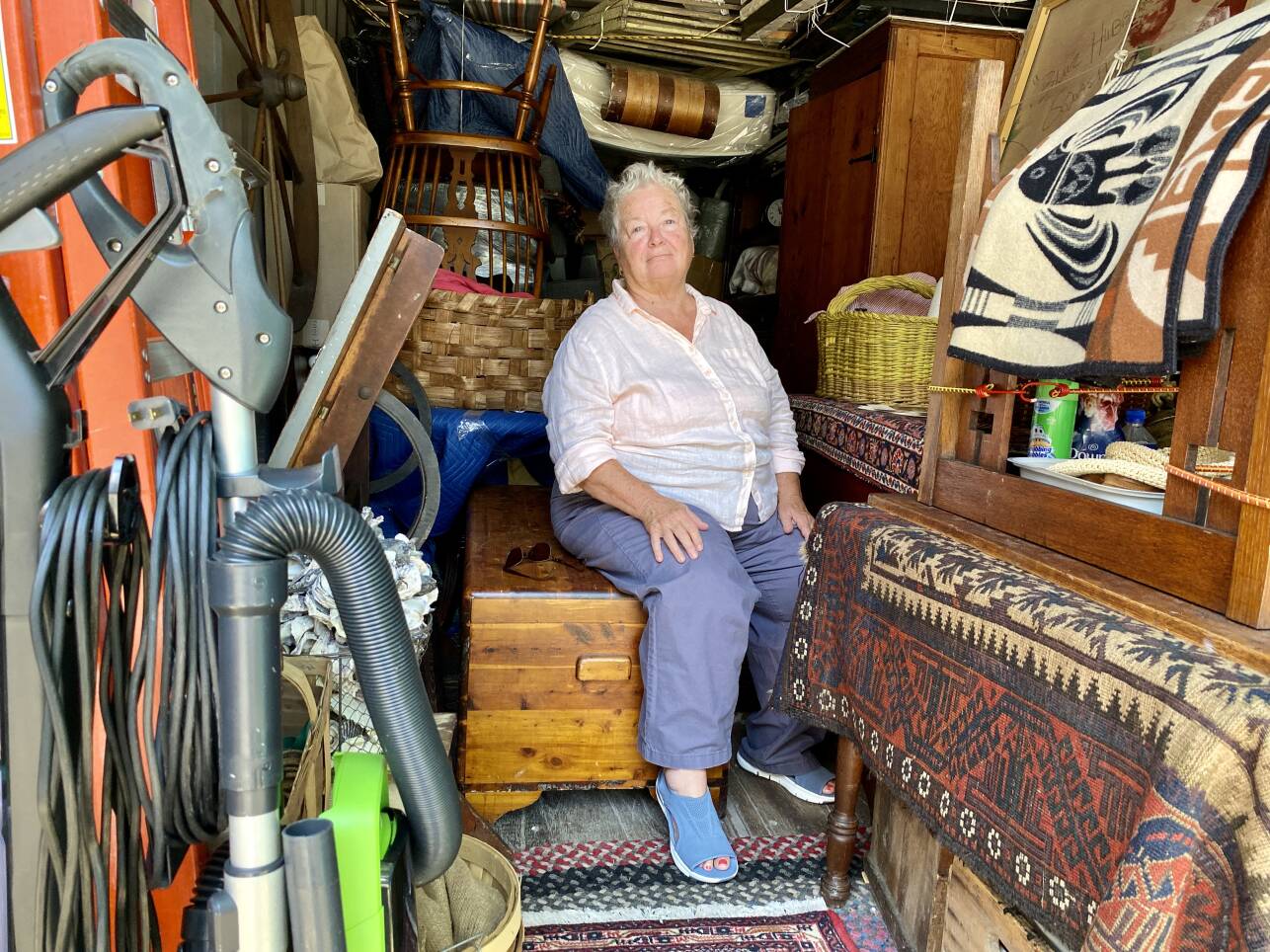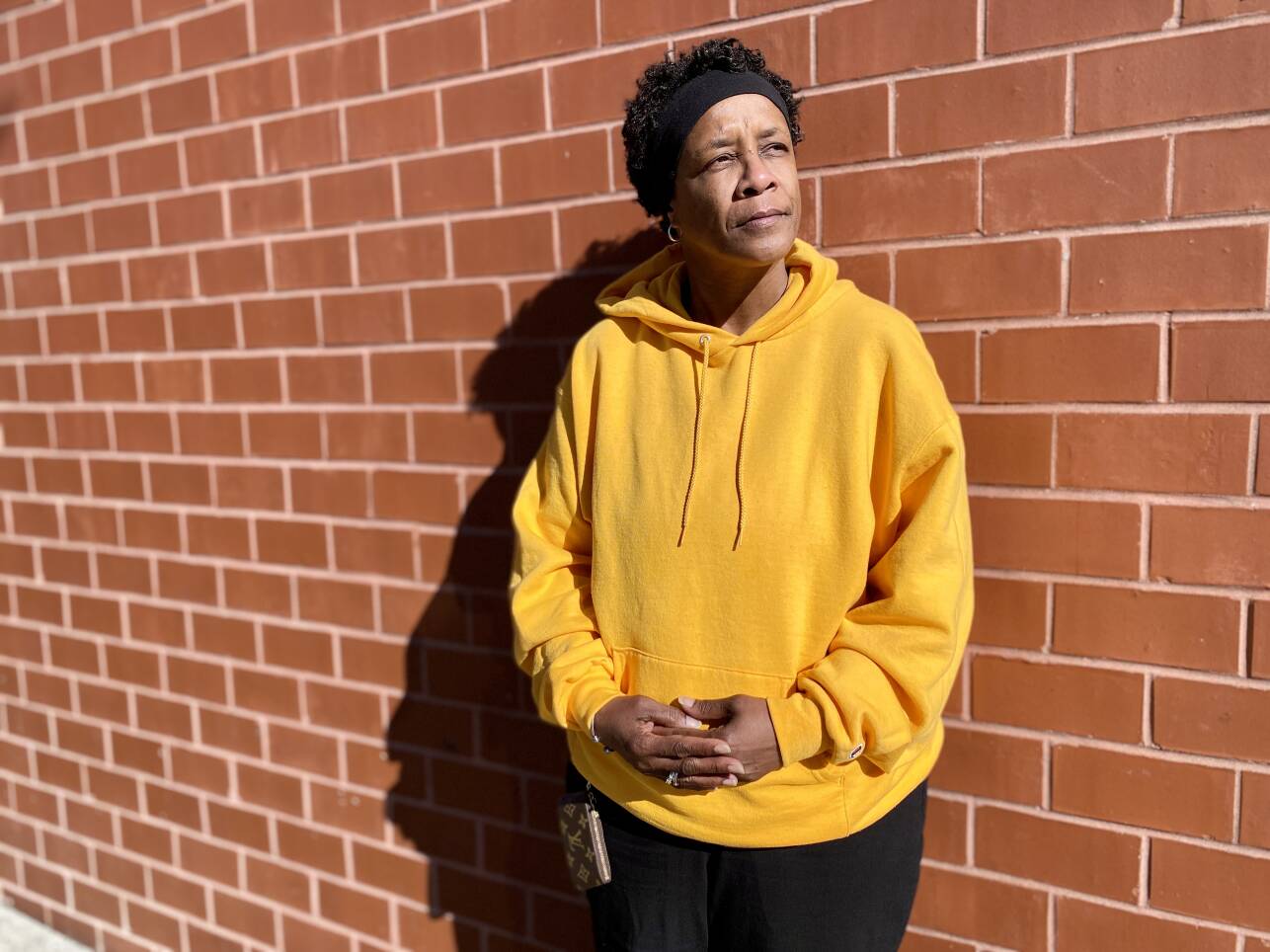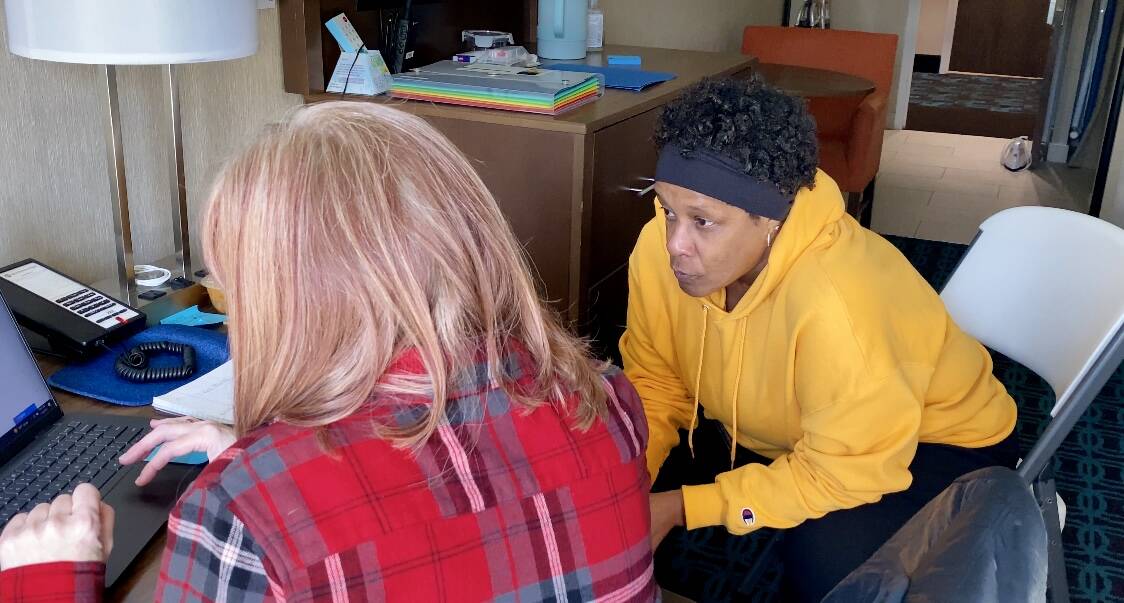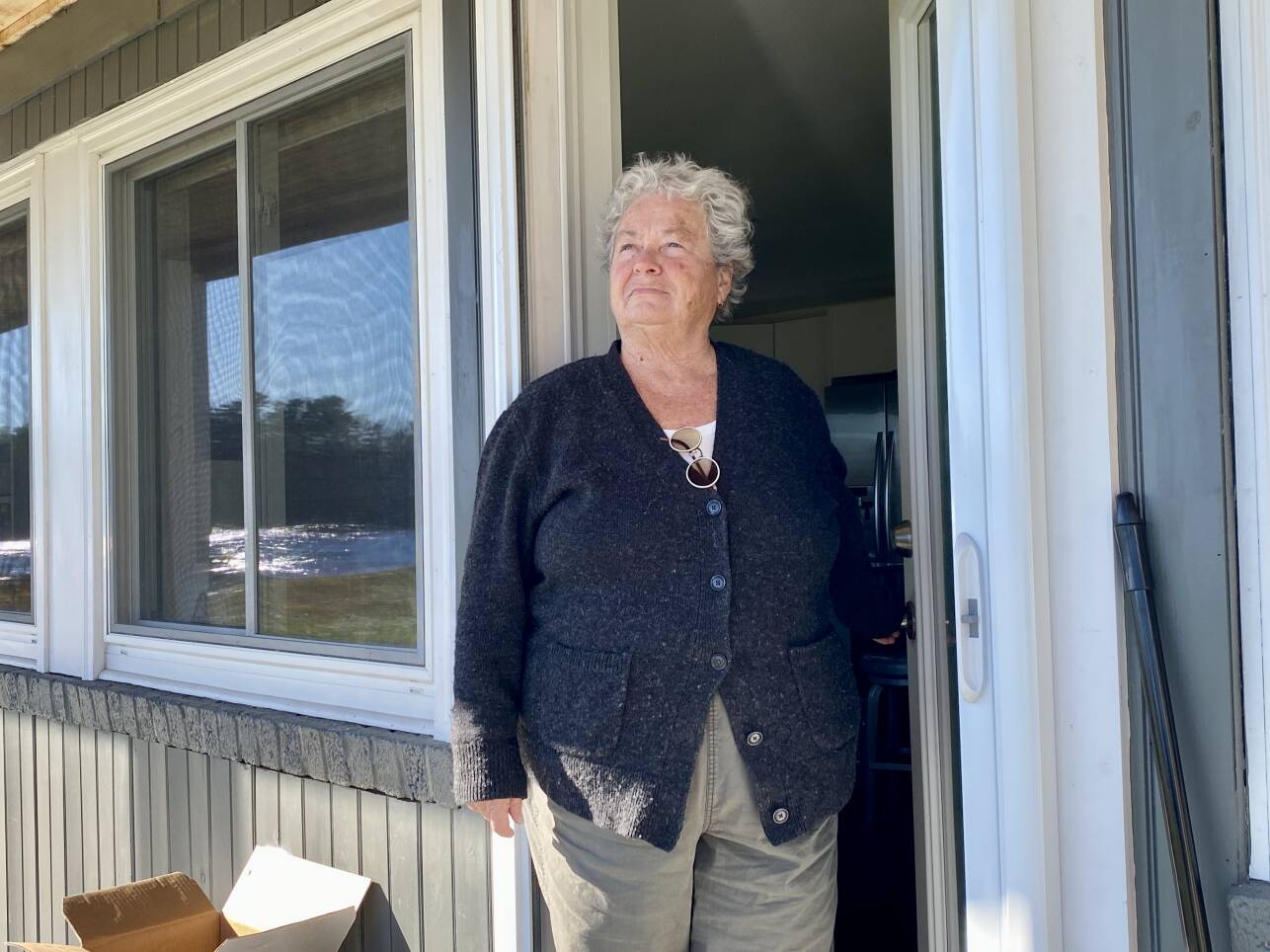As an early August sun rose over Newburyport, 72-year-old Judith bought a cup of coffee at a drive-thru and continued across the street to St. Mary’s Cemetery. She pulled up her Volvo SUV near a water spigot among the headstones, and got out to wash her neck and shake out her bedding.
It was a morning routine she’d established months prior after she was evicted from her apartment, and began living in her car as she struggled to find a new place she could afford. As winter wore on, she found snow easier to live with than the cold rains of March. And as summer arrived, she used mosquito netting so she could leave her car windows open at night. And as the second winter in the car approached, Judith tried to be stoic: she insulated the car windows from the cold, and slept under layers with a hat and thick socks. But, she admitted, despair had crept in.
Judith, who didn’t want her last name used citing privacy, called herself “fortunate enough to have a vehicle to sleep in.’' She pointed to the cemetery, where she’d seen other people experiencing homelessness, including, she said, a woman her age, living among the trees. But she never got close enough to talk.
“I don’t think it’s polite anyway,” she said. ”You have to maintain some kind of dignity even if you’re living in a tent in the woods.”
An established artist who has taught painting and worked in museums, Judith said she was financially dependent on her husband to help raise their children. After his death 20 years ago, she said she continued to make a modest living selling paintings and working part-time jobs.
More Housing
The line between being housed and unhoused was thin for Judith for many of the same reasons it is for other older women: a low-paying career, time spent out of the workforce to care for family, and financial dependence on a spouse who died. Record rents in Massachusetts have made the hold on housing even more tenuous.
Massachusetts has a high number of elderly renters, and many older women are struggling, according to Jan Mutchler, who directs the Gerontology Institute at UMass Boston. The institute found that 64% of single women ages 65 and older in Massachusetts are economically insecure — the highest percentage of any state in the country.
“In Massachusetts, the cost of living, and in particular the cost of housing, is so expensive that it’s a much bigger struggle and impacts many more older women in Massachusetts than in other states,” said Mutchler.

The struggle is worse for women of color. Nationwide, more than three-quarters of Latina women, 67% of Black women and 62% of Asian women aged 65 or older experience economic insecurity, according to the Gerontology Institute. Women of color are also more likely to be cost-burdened by rent.
“Older Black women, older women of color are more likely to be single, more likely to have lost a spouse earlier. And all through the life course, they’re at higher risk of struggling to accumulate financial resources,” said Mutchler.
Amplifying the problem for women is the fact that they live longer than men. Mutchler said she’s talked to a lot of older women who “literally are running out of money.”
"When we have children, the men are the breadwinners ... and then when they're gone, we don't know what to do."— Susan Seriam
Susan Seriam, who is Black, was in her 20s when her partner was killed, leaving her alone to raise four young children. Since then she has worked a series of low-paying hourly jobs at supermarket and fast-food outlets.
“When we have children, the men are the breadwinners and we lean more to our husbands or our significant others. And then when they’re gone, we don’t know what to do ‘cause we didn’t build that foundation ourselves,” said Seriam. “That’s what I did.”
Seriam had been paying $650 a month for a studio in Abington, barely affordable with the money she earned from part-time work and disability checks she receives after a bout with cancer. When her landlord died and his son decided to sell the multifamily home in August, he gave her two months to find a new place to live.
Given her low income, she found it an impossible task. Seriam, 56, ended up in a homeless shelter in Lowell before being transferred to a temporary room in a motel in Chelmsford, paid for by the nonprofit Community Teamwork Inc.
“I’ve never been homeless, this is the first time in my whole life,” said Seriam. “People feel like you’re less than because you don’t have a place to live. That hurts, and I never could identify with that until now.”

While older homeless adults are still overwhelmingly men, in recent years there’s been “a sharp increase in homeless older women,” according to Judith Gonyea, a professor at The Boston University School of Social Work, whose research focuses on older women and homelessness.
“We applaud motherhood. We applaud women caring for their spouses. But we don’t do much about what the cost is in terms of their economic vulnerability,” said Gonyea.
At Father Bill’s and MainSpring, which operates shelters in Quincy and Brockton, CEO John Yazwinski said he’s seen a rapid increase in the numbers of older people experiencing homelessness in recent years. In the last decade, women over 55 coming to their shelters have increased by 37%. Yazwinski said shelters are now the state’s “safety net.”
“The private market really is not an option because a lot of our elderly women are on a fixed income,” said Yazwinski. “Some of the women we’re seeing the last couple of years have lost their spouse. So maybe two incomes could afford that unit. But now they’ve lost a spouse, that they can’t make it in the private market, and then they end up having to come into the shelter.”
It’s well documented that America’s homeless population has been aging. A study that analyzed three major cities, including Boston, projected that homelessness among older adults would nearly triple by 2030.
But it’s hard to specify how many older women are experiencing homelessness, because there’s a shortage of national data broken down by age and gender. Experts have been calling for better national data. And starting this year, the Department of Housing and Urban Development, which collects data on homelessness, will require age data in the annual survey done by all local communities.
Karen Meehan, who has run the Salvation Army shelter for men in Cambridge for 25 years, said she’s noticed more older women seeking meals or a hot shower at their drop-in center but it’s been hard to track exact numbers because many homeless women try to stay invisible for reasons of safety and self-esteem.
She recalled an older woman who needed a blanket and requested “a dark blanket,” Meehan said, because it would help her hide at night.
There is a shortage of shelter for women of all ages because of high demand for beds and the fact there are few women-only shelters, according to Jill Gaulding, executive director of Chaplains on the Way, a homeless outreach organization based in Waltham. She said she’s seen many women get turned away from shelter, leaving them little option but to sleep on the street.
“We don’t want to imagine that, but women, including older women, have to spend the night in the ATM or find a warm place next to a building,” said Gaulding. “It means a tremendous amount of stress or physical danger.”
After she moved into a shelter, Seriam said she cried every night. Still, she remains determined not to burden anyone by crowding into a relative’s apartment or sleeping on someone’s couch.
“That’s just not my personality, I always had my own,” she said. “So, I feel like I’m going to stand here until I get my own again. That’s just the person that I am.”

Judith stayed with her daughter and son-in-law in their one-bedroom apartment for several months while she recovered from COVID-19, but she said it pained her to see them sleeping in the living room while she took their bed. And she, too was determined to keep her independence.
“I’m not interested in living someone else’s life. I really want my own life, my own home,” she said.
Judith’s landlord forced her out of her apartment in 2021 using a “no fault” eviction. She’d fought to stay and had been able to hold out for more than a year in her apartment during the pandemic. But by the time her legal options ran out, she hadn’t found housing and decided her best option was to live out of her car. She described the exhaustion of being constantly on the road: to find a bathroom, to get something to eat or to go to her storage container to get her laundry detergent or warmer clothes.
“It’s not safe living like this when you’re older,” said Judith, “You need more down time, you need more rest time.”
Standing at a dock where she’d come to recharge a battery to power her phone and laptop, Judith looked across the Merrimack River. She pointed out the steeple of a church next door to the home where decades earlier she’d raised her family.
“Once you lose your husband and that kind of clout and income,” said Judith, “the dynamics change radically for you.”
Judith has a government-issued voucher, known as Section 8, that covers most of monthly rent on a market-rate apartment, in her case for nearly $2,000. But she struggled to find a one-bedroom apartment that her voucher would cover. Affordable listings were often third- or fourth-floor walk-ups, which she couldn’t manage, or listings that were snapped up before she could apply.
"Once you lose your husband and that kind of clout and income, the dynamics change radically for you."— Judith, who was homeless for nearly a year after being evicted
Adding to Judith’s challenge was her determination to stay in the Newburyport area where she has friends, family and medical providers but where housing costs are high.
Judith’s desire to stay near her home community is not uncommon, according to Renata Rouke, director of Individual Homeless Services at CTI, who works with the many experiencing homelessness around Lowell.
“They won’t move,” said Rourke. “We explain to them, ‘There’s more vacancies, there’s more affordable housing in other parts of the state.’ But they will stay homeless rather than leaving their community.”
Section 8 vouchers are hard to come by and expire if unused. Newburyport granted Judith multiple extensions while she hunted for housing.
“We have folks here with housing vouchers and we’re still having a hard time getting them housed,” said Rourke, whose organization has applied for extensions for several of their clients. “There’s just a lack of vacancies.”

The Newburyport Housing Authority urged Judith to apply for public housing, but she declined to even apply — holding out hope to find a private apartment. The Housing Authority acknowledged that, while people experiencing homelessness have priority, the waiting lists for the limited public housing in the area are potentially years long.
There are also “thousands and thousands’' on waitlists for affordable housing, according to Tracy Watson, executive director of the Newburyport and West Newbury Housing Authorities. She said the majority of those waiting for state and federal housing are women, the elderly and the disabled.
“In Massachusetts we are in desperate need for additional affordable units,” said Watson. “I have waitlists like there’s no tomorrow.”
In the long term, experts say greater pay equity, access to childcare and social security credit for caregivers will help disrupt housing insecurity for women later in life. But the problem is far more urgent than the time it will take to make policy change.
“Right now the boat is filling up with water and we’re bailing, but not fast enough. So I think that the important thing to do right now is to try to stabilize people in their homes who are precariously housed,” said Patti Prunhuber, director of housing advocacy at Justice in Aging, a legal organization that fights senior poverty.
Her organization found that because many women face high rent burdens without housing assistance, “more women are experiencing homelessness for the first time as older adults.”
Despite her willingness to move anywhere in the state, Seriam is still searching for a home. She said she’d sent out more than 130 applications for subsidized housing but hasn’t had any replies.
In early December, Judith got good news. With the help of CTI, she found a ground-floor apartment in Amesbury she could afford with her housing voucher.
Her new home overlooks marshland and river and has space for her to paint. She said months of living in her car had left her feeling humiliated and numb.
“It really hasn’t hit yet,” said Judith, “But every morning so far… I’ve had my coffee and sat here looking at where I am and everything. I just cry. I just cry and cry and be grateful. I’m very grateful.”
GBH News pursued this story after hearing from women across Massachusetts, including Judith, who shared with us the difficulty of affording housing as they grow older. You can share your Priced Out story or ask a question you’d like answered by filling out this Google form. Find more from the series at Priced Out: The fight for housing in Massachusetts.



